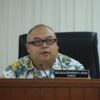Taimanao, who also chairs the Senate Committee on Fiscal Affairs, disclosed in an interview yesterday that the committee will conduct a three day work session during the Christmas season on top of its regular meetings.
She formed a sub-committee that will hold its own meetings in the next few weeks to go over the pieces of legislation affecting the CNMI retirement program.
Taimanao said she gave themselves up to Jan. 18, 2012 to come up with recommendations.
The Retirement Fund, according to its former consultants, has only three years to live. The government is unable to pay its over $300 million obligation to the Fund.
Taimanao said they have “vowed to make commitments in coming up with positive results.”
She added, “We want to assure the retirees and beneficiaries that we are working really hard on this because this is their livelihood.”
During the meeting on Tuesday, the committee agreed to conduct an assessment of all pending bills in the House or Representatives and the Senate that have something to do with the retirement program.
They will also look into the status of the Fund as well as its receivables and obligations.
She said they started working on some of those matters last Tuesday.
Taimanao Ind.-Rota, said the subcommittee will concentrate on pending bills and legislative initiatives.
These include measures the Fund opposes: Senate Bill 17-27 which will suspend the early retirement penalty, and S.B. 17-29 which will allow the repayment of early retirement penalty to be deducted from pension over time using an actuarially determined repayment rate.
The Senate bills the Fund supports are S.B. 17-35 which will transfer to the Department of Finance the function of paying the special annuity benefits for the former governors and lt. governors; S.B. 17-36 which will include adopted children into the definition of children who will receive retirement benefits; and S.B. 17-94 which will repeal the beneficiary derivative lawsuit act or Public Law 17-51.
Senate Legislative Initiative 17-3 proposes to allow qualified retirees to work as classroom teachers, doctors, nurses, and other medical professionals without loss of retirement benefits, regardless of the individual’s occupation prior to retirement.
Senate Legislative Initiative 17-15 will set aside $25 million each fiscal year to guarantee payment of the government’s employer contribution to the Retirement Fund.
H.B. 17-11 seeks payment flexibility for some Fund members; H.B. 17-13 will transfer to Finance the administrative function of the group health and life insurance; H.B. 17-14 will transfer to the Department of Commerce the Fund’s workers compensation commission; H.B. 17-40 will require that 60 percent of the judiciary collections are placed in the judicial building fund; H.B. 17-74 allows the Fund to assess interest on over- or under-payment of benefits; H.B. 17-77 seeks to amend the life insurance statute in order to negotiate a better life insurance policy for active members and retirees; H.B. 17-97 wants to include retirees from a chartered or incorporated organization as Fund members; H.B. 17-98 will stop the accrual of retirement or disability benefits beyond $40,000; H.B. 17-99 provides for an actuarially determined amount necessary for the Fund to be annually appropriated; H.B. 17-100 reorganizes the board of trustees; H.B. 17-204 will remove the June 2012 date for early retirement and require members to pay the lump sum of difference between Class I and Class II; H.B. 17-220 seeks to repeal the derivative law; and H.B. 17-226 allows members to get their money back.
The Fund supports most of these bills. Those it opposes are H.B. 17-11, H.B. 17-40 and H.B. 17-204. The Fund is neutral on H.B. 17-226 and has no position on H.B. 17-97.
According to Taimanao, they will try to put together the bills with similar intent and reconcile those that “go against each other.”










